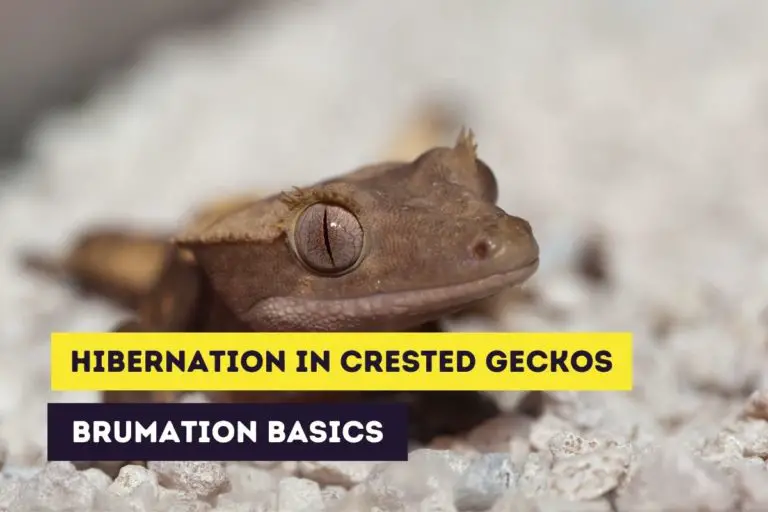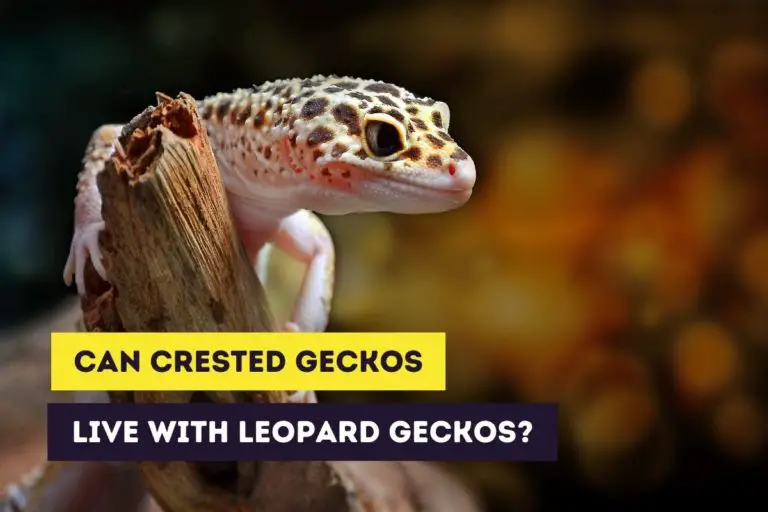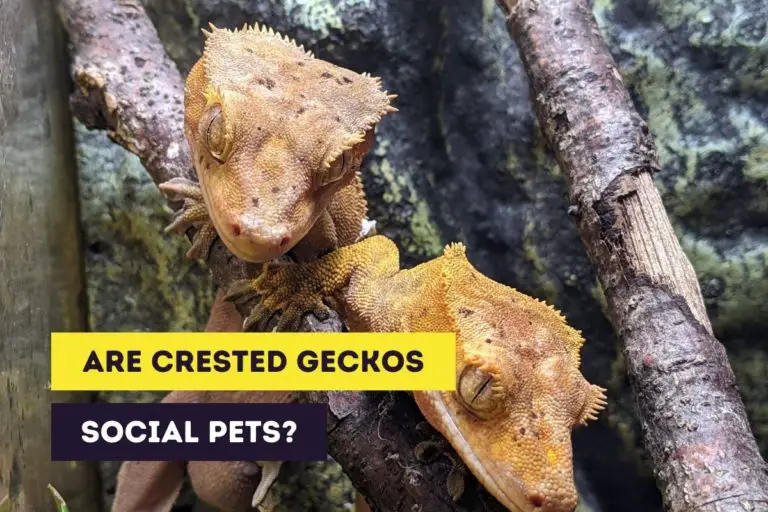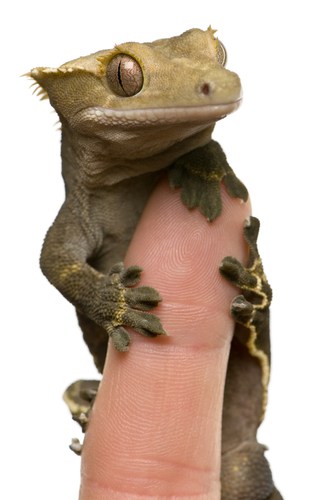Crested Gecko Bites: Reasons and Responding to a Bite
A lot of reptiles have very sharp teeth and some reptiles are even venomous which can make them dangerous for inexperienced reptile owners. Crested geckos have a large number of teeth – about 177 – and they’re replaced as sharks teeth do. Although these teeth aren’t really visible you might be afraid that your crested gecko bites you or your children and that it hurts a lot.
Crested geckos usually don’t bite unless they feel threatened. A crested gecko has a lot of teeth, but they’re tiny and will rarely cause the skin to break. The crested gecko bite can be compared to a fish bite that feels weird but doesn’t hurt and seldom causes bleeding.
Crested geckos are really friendly and docile pets. They will make noises and sometimes bark to warn others. Biting is a defensive mechanism – just like a tail loss – and will be one of the last resorts for your gecko.
But it’s entirely possible for any pet that has teeth, including the crested gecko, to bite for a number of reasons. It’s really important to get to know the reasons why a crested gecko might bite and learn the warning signs.
If you’re interested in stickers or other products of crested geckos, you can always visit our Etsy Shop, which is called Artful Animalia. We currently only send stickers in the United States. If you’re interested in certain crested gecko-related products, don’t hesitate to contact us.
In this article, you’ll learn the reasons for a crested gecko to bite, what the signs are that you have to back off, and more importantly what you’ll need to do when you do get bitten.
This site contains affiliate links to products we recommend and use ourselves. We may receive a commission for purchases that you make through these links. If you’re interested in learning more about our affiliate links, please visit our (affiliate) disclaimer.
Understanding Crested Gecko Biting
Why does a crested gecko bite?
Crested geckos can bite for different reasons but the most common reason is fear and/or stress. Male crested geckos are also known to bite when they want to mate. It is typical male behavior to bite the female while mating.
Crested geckos are prey animals that have few real defense mechanisms against their predators. In the wild, they will often just run away from a confrontation and hide. But your crested gecko doesn’t have a lot of room to hide and run away in a terrarium.
Common reasons for biting behavior:
- scared: if you reach for your crested gecko from above the geckos’ instinct takes over and thinks it’s a predator bird trying to catch them. Your crested gecko doesn’t have another way to escape except by squirming and trying to get loose, or by trying to bite.
- stress: the crested gecko doesn’t feel well and won’t like to be handled. If you notice signs of stress don’t try to pick up your crestie. Just let it calm down and try again at a later moment when your crested gecko is calm and stress-free.
- unfamiliar environment: this one is usually associated with a scared and/or stressed crested gecko. When you bring your crestie home it will need some time to adjust to its new environment. Wait a couple of days and get your crested gecko used to you and its environment, before trying to handle it.
The chance that you get bitten by a newly bought crested gecko is higher than the chance that you get bitten by a crested gecko that’s been in the family for years. This is entirely normal because they have to adjust to the new environment, which may cause stress. They’ll also need to adjust to you as a new person and might be scared.
How to read the warning signs?
A crested gecko bite rarely comes all of a sudden. If you want to prevent a bite you’ll need to learn the warning signs. When you know to interpret these signs you can know what your crested gecko is feeling and when it’s best to leave your crested gecko alone.
Crested geckos don’t have a wide variety of body language and vocalizations like other prey animals have. The most commonly observed warning signs are:
- mouth gaping: as a notification at you that the gecko is dangerous it will gape at you with its mouth open. Hatchlings will show this gaping behavior because they’re not used to being handled. It’s best not to approach your crestie when it shows this kind of behavior.
- tail twitching: the tail of a crested gecko is part of the defensive mechanisms of a crested gecko. It can fall off when stressed or in serious danger. Flicking and twitching of the tail is a sign of aggressiveness and stress that shouldn’t be ignored.
- vocalizations: squeaking and barking noises can be made when stressed.
- closely watching your every move: crested geckos can be quite curious but when a crested gecko follows your fingers every move or jumps against the glass when it notices you, it’s best not to approach and let it become calm.
Does a crested gecko bite hurt?
A bite from a crested gecko usually won’t hurt and will feel more like a nip or a punch. Most bites won’t cause the skin to break and bleed. You will feel the bite but it can’t be compared to bites from other reptiles or mammals.
Obviously, pain is a subjective feeling and some people have a low pain threshold while others have a high threshold. It’s difficult to say if the bite will hurt (much) in your individual case. A lot will also depend on the kind of bite.
Crested geckos have a lot of teeth but they’re very small. They also lack biting power – this is also the reason they can’t eat “hard” fruits. It’s a bit like a fish “biting” in your hand when your hand is in the aquarium. You feel something but it doesn’t hurt you. In some rare cases, the skin may break but this is seldom heard of.
Tips and Tricks to Prevent Biting
You can prevent a crested gecko from biting you by making sure that it’s happy and stress-free. The following tips and tricks can help you to prevent a crested gecko bite:
- wash your hands before handling: crested geckos are sensitive to smells and might get stressed when you still got the smell of another pet on your hands. They can also take a nip in your hands when they smell like something good. So, always wash your hands before you handle your crested gecko to wash away these kinds of foreign smells.
- don’t reach the crested gecko from above: crested geckos are prey animals. If you approach the crested gecko from above your geckos’ instinct takes over and in defense, it might bite.
- make sure that your crestie is aware of your presence: make sure that the crested gecko notices your presence and knows you’re going to come in the terrarium with your hand. Avoid any sudden movements as this can frighten your crested gecko.
- let the crested gecko make the first move: crested geckos are more “show” pets and don’t like handling that much. Make sure that they’re comfortable with you and maybe your crestie will come to you.
- don’t reach for your crested gecko while it’s in a hideaway/corner: if your crested gecko is hiding in a hideaway it usually doesn’t have any other escape route. You shouldn’t put your hand in the hideaway as this might frighten the crested gecko even more and cause it to bite.
- don’t reach for your crested gecko while it’s sleeping: crested geckos sleep during most of the day and don’t like to be bothered that much during this time. When you try to reach for your crested gecko while it’s sleeping it might be stressed and take a bite.
What to Do When You Get Bitten by Your Crested Gecko?
First reactions
When you get bitten you’ll need to make sure that your crested gecko knows that this behavior is not ok. Don’t become angry towards your crested gecko because this won’t help. The best thing to do is to stay calm and not remove your hand until the crested gecko stops biting. Crested geckos are prey animals that don’t have a lot of biting power and will release soon enough.
If you held the crested gecko outside of the terrarium, place it back and make sure that the lid or door is closed so it can’t escape.
Medical attention
A crested gecko bite can transfer bacteria and fungi into the wound. These bacteria and fungi can be dangerous for humans. One of the most common bacteria that crested geckos can be the source of is the Salmonella bacteria. Your crested gecko can appear healthy and show no signs of illness and still contain these bacteria. When you handle a crested gecko and when it bites you, these bacteria can be transferred to you.
You should treat a crested gecko bite the same way you would treat a bite from another animal. This means that you should:
- clean the wound: wash your wound with running warm water to remove bacteria, dirt, or other foreign materials.
- use antibacterial wash: apply an antibacterial ointment or wash with antibacterial soap
- getting a bandage (if necessary): apply a bandage to the wound to keep it clean
Crested geckos bites are usually not painful or deep and will almost never draw blood. However, a crested gecko bite can transfer certain bacteria or fungi to you or your child. If you’re worried about the injury the crested gecko bite caused, seek advice from a medical professional. This is especially true if you suffer from problems with your immune system or when a child is bitten.
Related Questions
Are crested gecko bites dangerous?
Crested geckos are friendly and docile pets but they don’t like to be handled that much. When a crested gecko bites it will usually not be the cause of a (serious) injury. It might scare you a bit the first time but it will usually not hurt. Bacteria and certain fungi can be transferred when you are bitten. These bacteria and fungi can be dangerous which is why it’s important to wash your hands when handling a crested gecko – and certainly when bitten.
Is a crested gecko a good pet?
Crested geckos are perfect pet reptiles for new and advanced reptile enthusiasts. They’re low-maintenance pets that don’t require regular handling and aren’t that difficult to feed and care of. As a first pet reptile, it is a great choice for (older) children and adults. Since crested geckos rarely bite and since a bite doesn’t hurt, it is also a good choice compared to some other reptiles and lizards that are more likely to bite and cause harm.
Do crested geckos carry any diseases?
Crested geckos can be the carriers of some bacteria and fungi that can be dangerous for humans. The most common infection that can be transferred is an infection with the Salmonella bacteria. You should always wash your hands when handling a crested gecko. People with a weak immune system, like children and adults older than 65 years, should not handle reptiles.
Want to Learn More?
If you want to learn more about crested geckos as pets, please read the following articles.
If you’re interested in getting crested geckos as pets you should also definitely read our article about baby and juvenile crested gecko care or (adult) crested gecko care.







